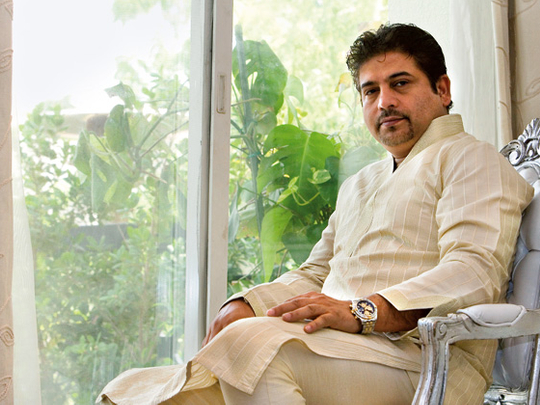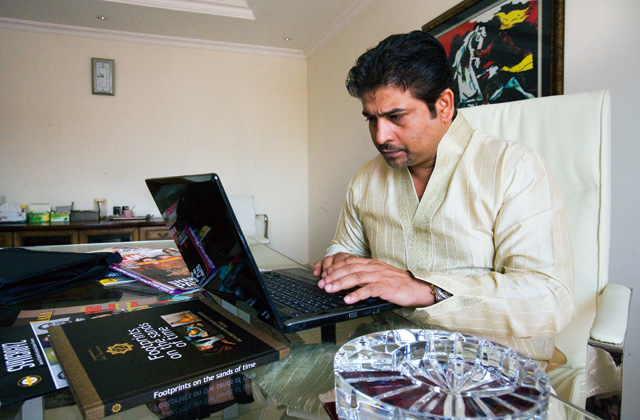
If ever there were a befitting example of a man who contradicts himself expertly, it would be Bharat Thakur, the name behind Artistic Yoga with 200 centres worldwide.
Ahead of the official opening of the Abu Dhabi centre this month, the ninth in the UAE, he says, "Yoga is not my business. It's my passion. I live for it." Later in the day he would say, "In the next ten years, I want 500 cities around the world to have my centres."
As we settle down to chat with the explicit aim to separate the man from the brand, he says, "I didn't realise when I grew into one [a brand] - and I don't want to. My job is to keep on working until my brand of yoga becomes bigger than my name."
He is part ascetic, part businessman. Further contradiction. This fact underpins Thakur's personality; for the outsider, the dichotomy in both his thoughts and actions is unsettling. The discipline of yoga makes you slow down, but he is racing in business. He lived a life of austerity in the Himalayas for 14 years and then realigned himself back with society, enrolling for a degree and venturing into business. Yet he continues to seek freedom from worldly associations, heading back to the mountains alone. He straddles two realms - spiritual and commercial.
On his website biography, he is referred to as a man who happily lives his contradictions. Perhaps it seeks to validate his position in high-profile circles where he is lionised by the likes of Hollywood star Michael Douglas, cricketer Shane Warne, former tennis champion Boris Becker, Bollywood actress Kareena Kapoor and business mogul Ratan Tata? Or explain his association with corporate houses like Infosys, Wipro, Acer and HSBC that use his Stress Management programme. Or even corroborate his print and TV interviews across Indian and international media platforms like Time magazine, India Today, Star TV and NDTV.
"I believe in the contradiction," says Thakur. "I also believe that after a certain turnover, one stops making money for himself. Instead, he starts making money for others, helping with employment. But yoga? That isn't part of my business. Through yoga I give back; educate teachers and students. My intention is not to make money out of yoga; I have other businesses for that."
His words resonate with his long-held belief that the essence of yoga was being trivialised in the West and being lost in Asia and other parts of the world. It is this sense of loss that fuels his breakneck speed of setting up new centres. He says, "The West doesn't understand the concept [of yoga], often breaking it into parts - breathing, cleansing, postures, etc. Yoga is a whole system, a discipline. I designed Artistic Yoga with ancient yoga techniques and a workout format based on the principles of exercise physiology and biomechanics integrated with asanas [postures], pranayama [breathing techniques], bandhas [body locks], kriyas [cleansing exercises], passive stretching and meditation techniques."
So does this sense of loss apply to his years in the Himalayas?
"I'm a loner… A loner doesn't experience loss," he says. "I've lived most of my life alone; I am very happy." Thakur received the sobriquet "Living Himalayan Master", popularised after an interview with Time in 2001. The sobriquet is now the tagline for Artistic Yoga. "The magazine wanted an Indian master to write on the subject. That article got worldwide recognition," he says.
Work
To understand my journey so far, I have to start from the beginning. My parents, then childless, vowed to dedicate their firstborn to the master Sukhdev Brahmachari who used to visit my family. I was that firstborn.
At four, I left my family including my sister (two more siblings were born later) to go with the master. For most of the 14 years, along with three pupils, I lived close to Gaumukh [terminus of the Gangotri Glacier] in the Himalayas, which is more than 32km from the nearest village.
I studied yoga intensively. I also studied Ayurveda, Tantra [spiritual totemism] and Mantra [chanting] as well as the tenets of Sufism, Jainism and Buddhism. I learnt to survive, foraging for meals and controlling my body temperature [through breathing] to avoid frostbite. Life continued with little knowledge of the outside world.
Then my master asked me to leave for a formal education, directing me to a priest friend of his in Kolkata. I did, and went on to complete my undergraduate and postgraduate studies in Exercise Physiology and Yoga from The Lakshmibai National College of Physical Education, Gwalior. I funded it by imparting the knowledge - Sanskrit, mountaineering, yoga, etc - I had acquired. By then I had established some contact with my family. I was 25 years old.
Around that time, I sensed that I had to visit my master. When I met him, he gave me diksha [a rite of initiation to take on a spiritual discipline], empowering me to preach at a spiritual level. Soon after, he breathed his last.
I took up a job as a yoga teacher at a fitness institute. From a few students, the number increased to hundreds. I was introduced to influential people who in turn introduced me to their inner circles, leading to the interaction with Russi Mody [former chairman and managing director of Tata Steel, a Fortune 500 company]. He made me who I am today, teaching me the ABC of business. He treated me like a son. He said, "You are the best teacher, but how many can you teach yourself? You should have hundreds of teachers below you."
Thus I continued to help people who were in [physical] difficulty and those who needed to understand life better. Before I realised it, I was making new connections - from Bollywood to Hollywood and even political figures - through yoga and opening new yoga centres. [Artistic Yoga was launched in 1999.]
Recently I opened three centres in Sharjah, Dubai and Ajman as well as in neighbouring countries Bahrain and Oman. I don't plan these; my corporate office does. I head the BT Group that has investments in stock markets and owns a diverse portfolio in software, film production, mineral water, diamonds, health food, etc. There are many things I'm attached to, but I need time off alone to meditate and pray; I won't even take my wife [Indian actress] Bhumika Chawla along.
Play
I'm not entirely ‘together' even today. I live a lonely life, moving from place to place, teaching where I want to. In a way, it is the same mountain life. For instance, my stomach isn't accustomed to consuming cooked food, especially restaurant food. I used to survive on roots, herbs, berries and boiled meat with no salt for years. I prefer to eat mostly raw food.
The time away from home also affected my familial ties. I am not very close [to my family]. The initial bonding that takes place when one is young did not happen in my case. Though I am there for them whenever they need me.
I love spending time in the mountains - the Himalayas. As a young boy, I used to find a vantage point and relax; I still like doing this. I can spend months [in the mountains]. Other than that, I am a movie buff - romance and drama, not action.
Nothing stresses me. A typical day for me includes a few hours sleep (three to four), meditating (three hours) and conducting online meetings early morning. Sometimes I play golf. In terms of creative pursuits, I write books on yoga and poetry. When I first starting writing [books], it was to spread awareness about yoga in mainstream society, and later, I formalised my spiritual knowledge as well. I've written eight books - Yoga For All; Yoga For Stress Relief; Yoga For Weight Loss; Yoga For The Family; Yoga for Flat Abs; Yoga for Backache Relief; Desktop Yoga; and a collection of poetry titled Truth: The Art of The Mystics. My novel on poetry, Firdaus, will be published by Wisdom Tree next month. Speaking of which I recall writing 200 short poems in one night. I also enjoy painting and singing.
Dream
Not many know this, but my company is involved in commercial agriculture in my hometown Bihar where my family owns land. By farming in this area, I support the nearby villages. It's my way of doing something that my ancestors did - farm. I have managed to fund a small school and a hospital too. I am still not doing the absolute best I can. I need to do more, starting with yoga. In the next ten years, I want 500 cities around the world to have my centres. I am hoping for more than 20,000 yoga centres. I want to disseminate my knowledge to millions - whether through yoga or books. My job is to keep working and not worry about being called a brand or celebrity.
I want to train more trainers so they can spread the philosophy and science of yoga. I have so many dreams… I want to be open to new possibilities. I recall the time when Bhumika and I were visiting an Indian city where we didn't like the taste of the local water. So I said, "Let's open a water bottling company". Soon enough the mineral water company, Elixir Water, was up and running. Outside of business, people have hinted at me engaging in local [Indian] politics. I don't intend touching that area - it's not my forte.
Ask me whether I predicted this level of success, and my response is - yes. I'd like to compare my business ventures - more than 42 - to a game of chess. They are strategy based. I create businesses and put systems into place, funding them and employing professionals to run them. I hope to create several offices funded by me.
I can't stay in one place for long; I cannot be comfortable, I have plans to live in Singapore, Hong Kong, China, Japan... I would like to live in a country for a few months and when I can no longer [bear to] stay, move to the next. From Dubai, I am going to Bali. So ask me about my home, and I will say its nowhere and everywhere. If I stayed in one place, I will start accepting and expecting the comforts of life.
To know more about Bharat Thakur's Artistic Yoga centres, log on to: http://www.artisticyoga.com/













